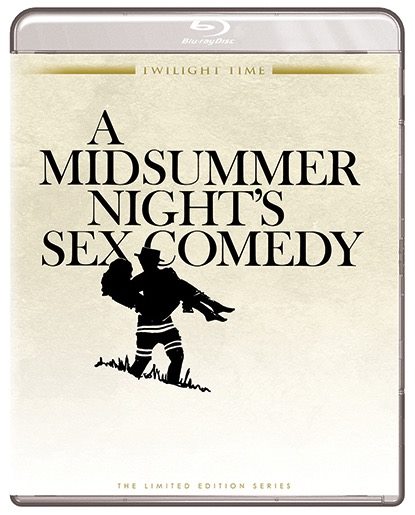

The first thing to like about Woody Allen's A Midsummer Night's Sex Comedy is its cheeky title, all at once a nod to Shakespeare's A Midsummer Night's Dream (with its Dream-y magic realism an implied promise of this modern old-fashioned farce), an opening of dialogue with Felix Mendelsssohn (who gets a "music by" credit during titles accompanied by A Midsummer Night's Dream's "Wedding March"), and a winking reference to Allen's Midsummer Night-set source material: the 1955 Ingmar Bergman comedy Smiles of a Summer Night. Allen's 1982 film is precocious like that: clever, amusing, and smile-worthy, though never quite (to Allen's everlasting chagrin) Smiles-worthy.
All of the above creative works share a verdant countryside setting that's basically antithetical to urbanite Allen, a rare exception that proves his rule. In all other respects, this is pure mid-period Allen, a muscle-stretching ensemble comedy with dramatic undertones and playful philosophical musings. Many of Allen's most important collaborators are on hand, including Mia Farrow (in her first of thirteen Allen films), Tony Roberts (in one of his six appearances opposite Allen), production designer Mel Bourne, costume designer Santo Loquasto and, most importantly, director of photography Gordon Willis (who shot eight of Allen's finest films, not to mention The Godfather and All the President's Men).
As per Bergman, the fin de siècle A Midsummer Night's Sex Comedy gathers its six characters on a country estate, where they enact a dizzying sexual roundelay veiled behind secrets and lies. With a couple of recognizable stock characters, the relatively light, summer-y country garb, and a meddlesome handgun lying around, Chekhov also springs to mind. The weekend is intended to celebrate the upcoming wedding of elderly philosophy professor Leopold (José Ferrer) to winsome, Botticelli-coiffed Ariel (Farrow). Leopold's cousin Adrian (Mary Steenburgen) and her inventor husband Andrew (Allen) play host, even as they troubleshoot their own sputtering, sexless union. Andrew's best friend Maxwell (Roberts), a randy doctor, and his weekend date Dulcy (Julie Hagerty), a nurse, round out the party.
Allen neatly fits his characters into a sex-farcical formula: three men, three women, each of them sexually linked to at least two of the others. That Leopold is a humorless pedant—and the fact that his bride-to-be once nearly consummated a date with Andrew—starts the weekend off on a decidely awkward foot. Leopold pooh-poohs metaphysics ("Apart from this world, there are no realities"), alienating his company as they attempt to embrace the possibilities of a weekend alongside what dreamer Andrew calls "enchanted" woods. It doesn't exactly help matters when inveterate womanizer Max begins openly flirting with Ariel, though it emboldens Leopold to pursue a wedding-eve last fling with Dulcy. Though his mantra is "marriage is the death of hope," Max insists to Andrew he's found love with Ariel. Meanwhile, Andrew has his own burgeoning designs on Ariel while worrying over his road not taken with her. "The saddest thing in life," he muses, "is a missed opportunity," and Ariel seconds that emotion.
Allen's Sex Comedy moves along smoothly toward its genuinely surprising multiple climax, but it's as much about the journey as the destination. Allen's characters ponder the permeable divide between lust and love, and the meanings of sexual intercourse ("People find out things about themselves through lovemaking that they never dreamed of"). That last thought, along with "There's more to life than what we perceive with our five senses," stealthily paraphrases Shakespeare's Hamlet ("There are more things in heaven and earth, Horatio,/Than are dreamt of in your philosophy"); elsewhere, Leopold scoffs at the film's larks into supernatural territory by paraphrasing A Midsummer Night's Dream itself, with his observation "Shadows, glowing things, spirits. What pathetic delusions we frightened humans cling to." Indeed, what fools these mortals be, the better for our entertainment. Then again, another bard, Cole Porter, seems to have inspired the nicely shot and edited montage of woodland nature Allen ironically juxtaposes to the neurotic humanity in near vicinity: "Birds do it, bees do it/Even educated fleas do it./Lets's do it, let's fall in love..."

|
|
 |
California-based Twilight Time makes available classic films in editions strictly limited to 3,000 units (distributed exclusively by Screen Archives Entertainment). Overseen in large part by star archivists Nick Redman and Mike Matessino, these releases all feature fresh hi-def treatment that includes isolated score tracks and six-page color booklets with original publicity shots, poster art, and excellent liner notes by film historian Julie Kirgo. Twilight Time selects neglected titles and makes the studio's home entertainment divisions offers they can't refuse: let Twilight Time handle the releases and cater to an audience of devoted film collectors. The strategy has worked out nicely: as the titles move toward selling out, they become hotter and hotter collectibles.
In its hi-def debut, A Midsummer Night's Sex Comedy looks lovely, with only stray dust to occasionally draw the eye from Gordon Willis' superb photography. This in-all-likelihood dated transfer is as good as the film is going to look unless and until someone springs for a 4K master; that said, the film looks better than ever in this home-video presentation, which preserves a natural filmic look with handsome grain structure and accurate contrast and color. Detail and texture easily trump the shaky old standard-def DVD presentation. In the audio department, the DTS-HD Master Audio 1.0 track soundtrack likewise stays true to the original theatrical presentation, making it a definitive listen backed up by Twilight Time's customary Isolated Score Track. Happily, there's nothing rough or tinny about the audio here, despite its limited range and aging vintage. Dialogue is always entirely discernable, and the classical score pleasing to the ear.
The other extras, per Allen's own custom, are slim: the nifty "Original Theatrical Trailer" (1:19, HD), the "MGM 90th Anniversary Trailer" (2:06, HD), and the six-page liner-notes booklet containing film stills, poster art, and Kirgo’s essay.
 |